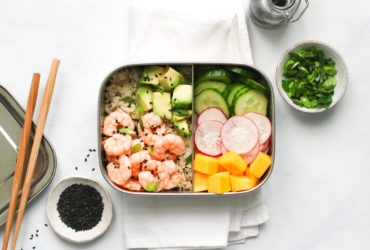The most common causes of bloating can be down to swallowing too much air whilst eating, but also from fermentation when certain types of carbohydrate reach the gut.
It’s important to remember that eating will always cause some sort of stomach distention which is a normal part of life. Whilst bloating can be one of those frustrating side effects that can really occur in anyone, if you regularly end up with an extreme distention of the stomach such as a ‘food baby’, there could be something more at play and it would be advised to get advice from your healthcare provider.
Q: How long typically does it take for that sort of bloating to go down?
We are all unique and the time it takes for the symptoms of bloating to subside can really vary from person to person.
Q: How can we avoid bloating?
1. Mindful Eating
The first step to manage bloating is to assess the way you’re eating. Mindful eating can be a great first step for helping to improve digestive health, focus on chewing thoroughly, eat slowly, and eat away from distractions such as your laptop, TV and phone.
By eating mindfully you can help with optimal digestion and may minimise the occurrence of bloating.
2. Reduce Stress
Both physiological and psychological stress causes the same bodily stress response which shunts energy away from digestion, which may lead to fermentation within the gut and subsequent bloating.
3. Detect Food Intolerances
Food intolerances such as a lactose intolerance may contribute to bloating. On the other hand FODMAPS which are poorly digested carbohydrate molecules found naturally in many foods may also trigger symptoms The gold standard method for detecting a food intolerance is to carry out a food elimination diet, which is best done under the guidance of a nutritionist or dietician.
4. Keep Moving
Lastly focus on minimising constipation by consuming enough fibre within the diet and taking regular exercise. Research suggests that a 20-30 minute brisk walk several times a week can help to stimulate peristalsis within the gut and improve bowel function.
Q: Why do I feel bloated when at work, and how can I alleviate symptoms?
Desk jobs can result in a sedentary lifestyle which can hinder digestive health. Movement is a key factor for stimulating peristalsis (muscle contractions) within the gut which can help to move everything along. If you regularly suffer from bloating, try getting up off your desk and walking around the block or try regular stretching throughout the day.
Prevention is key when it comes to bloating because there are limited options to alleviate symptoms. Whilst movement may help, some people swear by fennel tea and peppermint oil capsules for their soothing effects on the stomach.
Q: Can chronic bloating after eating be bad for us?
Everyone will struggle with bloating from time to time, and this is a normal physiological response to eating. However with more extreme cases, it could be a symptom of a more serious underlying medical condition such as coeliac disease or Inflammatory Bowel Disease (IBD), therefore it’s important to seek advice from your health care practitioner.
Q: Are there any lunch time foods which help or hinder bloating?
Anything which is known to cause you to be gassy such as beans, onions, broccoli, cabbage, sprouts and cauliflower. Whilst these foods are certainly healthy, they could be one to avoid if you suffer from that post lunch bloat.
Opting for blended foods such as soups, smoothies and juices are easier to digest and may help to keep symptoms at bay.
About Lily
Lily is a London Nutritionist who graduated from Newcastle University with a BSc (Hons) degree in Food and Human Nutrition (AfN accredited) where she was awarded with the Sage Faculty for Excellence Scholarship on an annual basis. She has also graduated from Surrey Unversity with an MSc in Nutritional Medicine (AfN accredited) where she was awarded with distinction. She has also completed a postgraduate Diploma in Nutritional Therapy. Lily’s extensive knowledge of the science of food and health, enables her to regularly write for The Times, The Telegraph, The Daily Mail, The Independent, Women’s Health and Cosmopolitan.
Her frequent TV appearances include ITV’s This Morning with Holly Willoughby and Phillip Schofield, and ITV’s prime time series Save Money: Lose Weight with Dr Ranj Singh. Lily’s passion is to simplify the science around nutrition, to provide health hacks and smarter eating strategies to empower people to enjoy a healthy and successful lifestyle. Her specialities lie in workplace wellness, implementing nutrition focused wellbeing programmes within corporate organisations across the UK.





Love the bloating article!